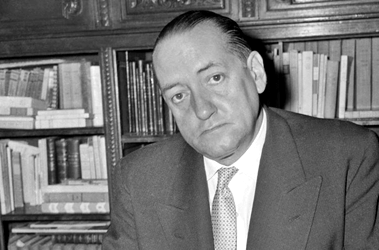
On 8 May 2012, the Lycée Français in Havana received the name of one of Cuba’s greatest writers: Alejo Carpentier. The ceremony was presided over by Ms Anne-Marie Descôtes (Director of the Agency for French Education Abroad) and Mr Jean Mendelson (French Ambassador to Cuba).
Alejo Carpentier was born of a French architect father and a Russian mother who was a language teacher. For a long time it was thought that he was born in Havana, where his family settled shortly after his birth.
The life of this writer is in itself a cultural bridge between France and Cuba. He was 12 when his family moved to Paris, where he began studying musicology. When he returned to Cuba, Alejo Carpentier began studying architecture, which he never completed. He devoted himself to journalism, but his commitment to the left earned him a spell in prison (1928), under the presidency of Gerardo Machado, before forcing him into exile in France. There he met the Surrealists, including André Breton, Paul Éluard, Louis Aragon, Jacques Prévert and Antonin Artaud. During his stay in France, he made several trips to Spain, where he developed a fascination for the Baroque.
Returning to Cuba in 1939, he pursued a career as a journalist and radio commentator. He became interested in Afro-Cuban culture. In 1943, he was marked by a stay in Haiti. In 1945 he moved to Caracas (Venezuela), where he lived until 1959. After the triumph of the Cuban revolution, he returned to Havana. In 1966 he became a counsellor at the Cuban embassy in France, where he lived until his death.
Alejo Carpentier is a writer most famous for his baroque style and his theory of the real maravilloso. His best-known works in France include Le Siècle des Lumières (1962), La Guerre du Temps (1967) and Concert baroque (1974). His first novel, Ecue-yamba-o! (1933), is Afro-Cuban in inspiration. In Le Royaume de ce monde (1949), his first major novel, he evokes the Haitian revolutionary movement. It was also in the prologue to this novel that he described his vision of the real maravilloso, which critics identified with Magic Realism.
His stay in Venezuela from 1945 to 1959 clearly inspired the description of the unnamed South American country in which most of his novel Le Partage des Eaux (1953) is set.
His novel El Recurso del Método (The Methodical Recourse), published in 1974, is one of the great novels of Latin American literature to portray the typical dictator. It was adapted for the cinema by Miguel Littín in 1978 under the title El recurso del método (released in France as ¡Viva el presidente! and Le recours de la méthode).
In 1975 he was awarded the Cino Del Duca World Prize. He was awarded the Prix Cervantes in 1977 and the Prix Médicis in 1979.
He died in Paris on 24 April 1980. His body was transferred to Cuba, where he was buried in Havana’s Colón cemetery. His funeral was held on 28 April, in the presence of President Fidel Castro.
The Lycée Français in Havana pays tribute to this great writer and wishes to perpetuate the importance of his work.